Gentlefolk,
Well, I survived the first week of teaching. Although I've done this for 4 years, I still get nervous at the beginning of each new semester and before each new class. I needn't have worried - it all went OK. The students are great and I'm looking forward to working with them over the next 4 months.
The big news is that Andrew has accepted a transfer to Google's Hong Kong office and he, Caroline and little Eddie will move to Hong Kong in October. They certainly can't complain that life is boring.....
Other highlights of the week: the Dow Jones hit another record high; Alibaba's sterling debut in the New York; Scotland rejected independence (I was rootin' for the Yes side, Vera for the No side); and Li Na announced her retirement from competitive tennis.
Remember I use US$ in this blog - the Aussie dollar is too volatile - so all references to money are in US dollars. The exchange rate at the moment is US$1 = Yuan6.13.
Kuala Lumpur
Below are some photos of Kuala Lumpur we took on our visit there 2 weeks ago. Guess we won't get back to KL for a while as our focus will now shift to Hong Kong.
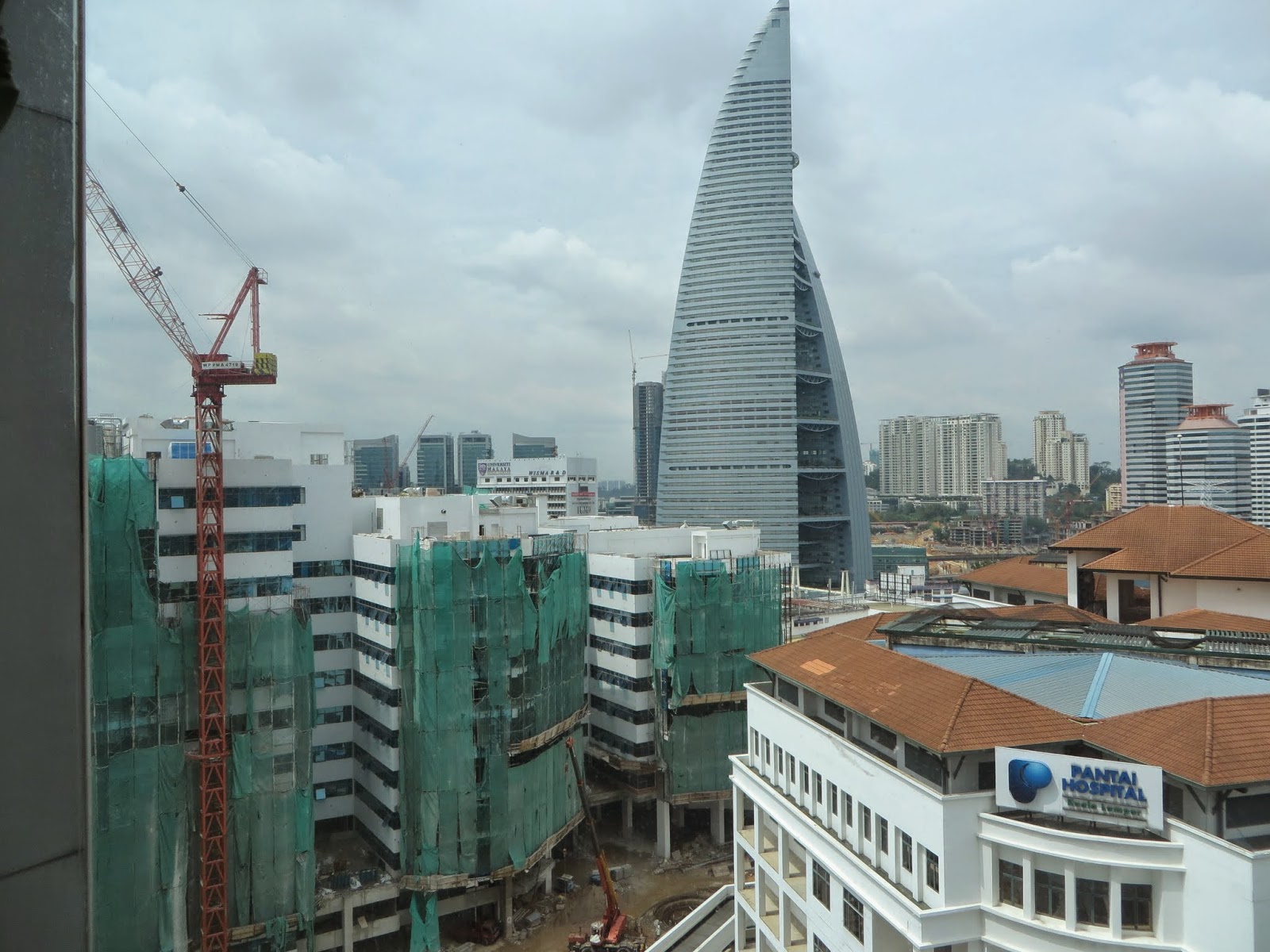 |
| Andrew & Caroline had a lovely apartment in the Zehn Towers next to Pantai Hospital in Bangsar. This was the view from our bedroom window, looking across the top of the hospital (lots of new construction) to the interesting Telecom Building. I wish we in Australia would be a bit more adventurous with our architecture. |
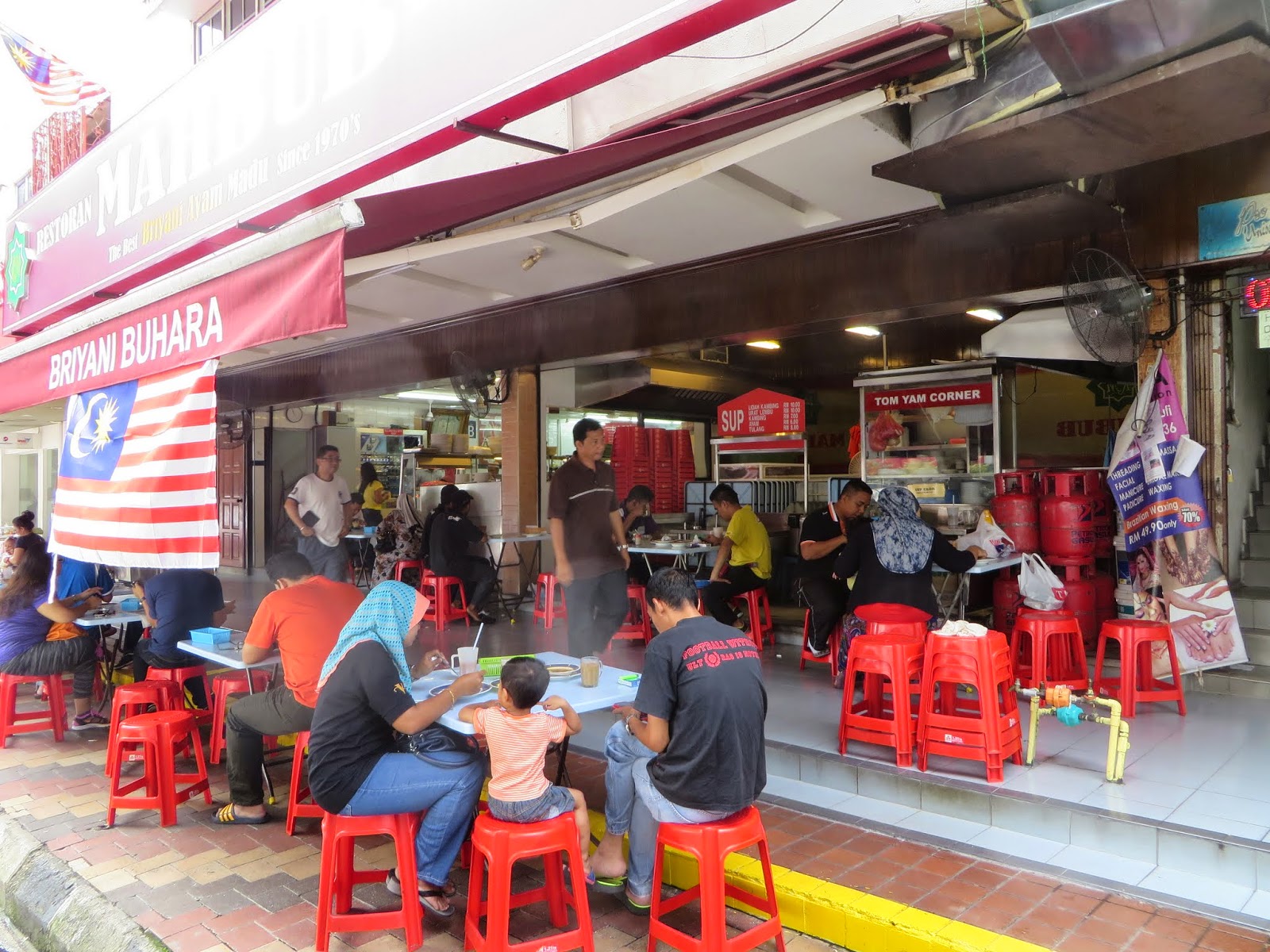 |
| Our favorite restaurant at Bangsar Village shopping centre, about 1.5 km from their apartment. Indian-Moslem food. Their special curry chicken (nasi briyani dan ayam madu) was delicious. For about $4 you get the curry dish and a tasty Teh Tarik! |
 |
| All roads lead to the iconic Petronas Twin Towers (KLCC). The huge shopping mall included an Isetan Department Store and Supermarket which was featuring a 2 week "Australian Food Promotion". Reminded me of Singapore 20 years ago when I organised many similar promotions. |
But let's get back to China. For this post I have included some details of student living conditions and also the compulsory military training they undergo when they first start college.
Student living conditions
Student living conditions and costs are very
different from back home.
All students must live on-campus, even those from
nearby suburbs / towns. There are separate
buildings for males and females. Only
dormitory living is available. Typical
dorm rooms for undergraduates feature 6 beds.
A few days ago one of my English Major students, Oliver, showed me his dormitory (see photos below). His dorm is on the top floor - these rooms are smaller, 4m x 4m - and accommodate only four students rather than the usual six.
There are shared toilets down the corridor, but these bathrooms
only have cold water sinks. Students
have to shower in the large communal bath house.
The cost of accommodation in a dormitory is Y1,000 ($160)
per annum. For that they get a bed,
locker, and small work table and chair (see photos). Students pay an additional $110 for a thin mattress, sheets, quilt, and mosquito
nets (their uniforms for military training are included in this payment).
Airconditioning is not provided or permitted. Heating (via wall-mounted hot water heaters) is
provided free of charge in winter. Oliver said that heating was adequate in winter, but other students sometimes complain that their dorms are cold (temperatures here can get to minus 20 C and below !).
The student residential buildings are strictly
supervised. The doors are open from early morning to 11pm. If you get home after 11pm you have to hope that the building warden will let you in.
Electric power in student residences is turned off
at 11pm. So it's lights out at 11pm, but these days many devices run on batteries so often students will stay up longer playing computer games or listening to music or reading.
There are no laundry facilities in the residential buildings. Students must do their own washing (usually in the hand-basins in their toilets and use their balconies to dry
clothes) or go to a commercial laundry and dry cleaner on campus.
The student residences do not include cooking
facilities. There are three large
student dining halls on the campus. Meals are served at the following times:
Breakfast 6.30 – 8am
Lunch 11.30am
– 1pm
Dinner 5.30
– 7pm
Food in the dining halls is inexpensive. Vera
and I normally eat in the student dining halls.
We eat pretty well and usually spend around $1.50 each for lunch and perhaps
$2 each for dinner – most students would spend less than us.
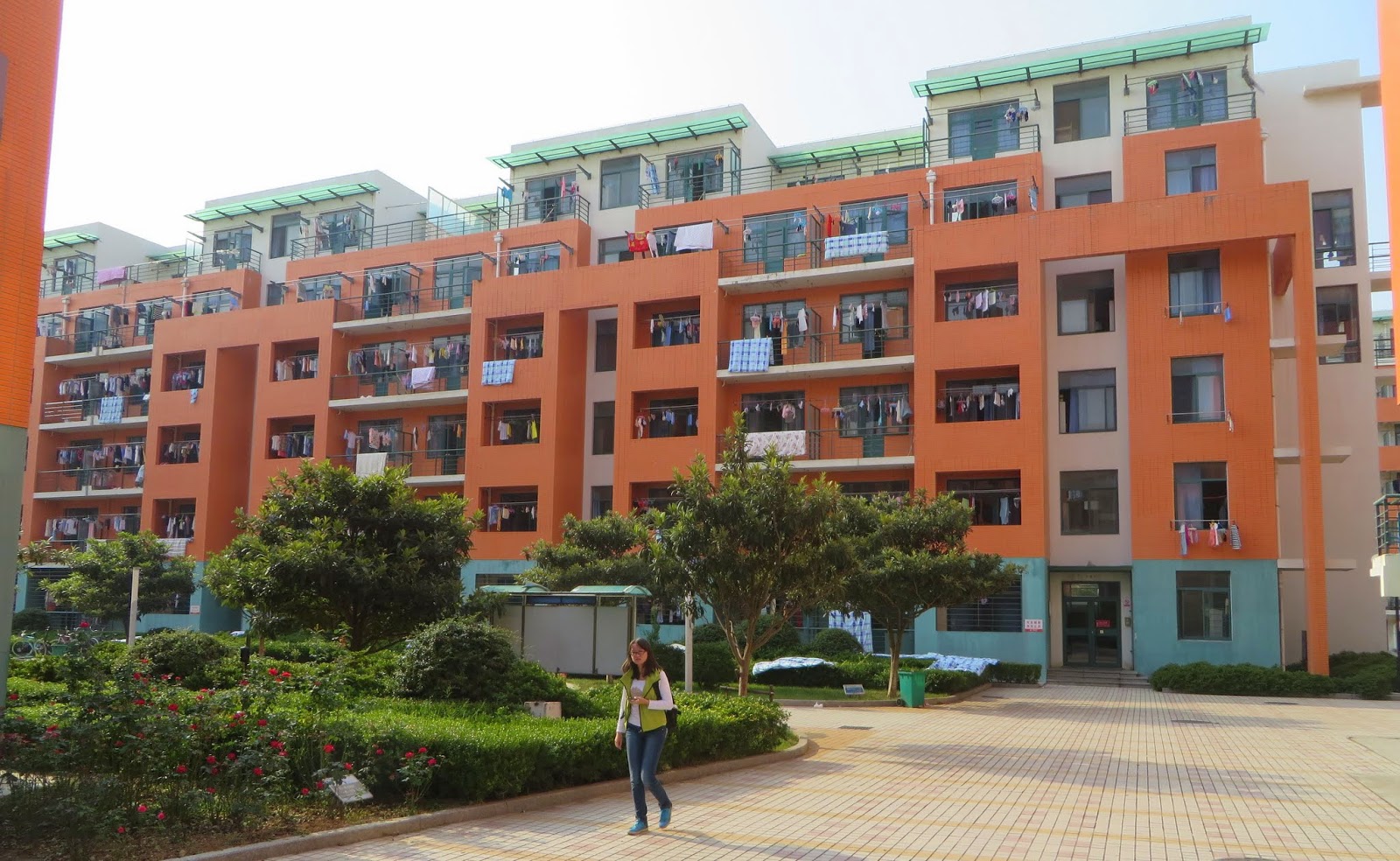 |
| A typical student residential building on our campus. Six floors, walk-up. Most dorms accommodate 6 students, but the rooms at the top are smaller and accommodate 4 students. Note the clothes drying on balconies. |
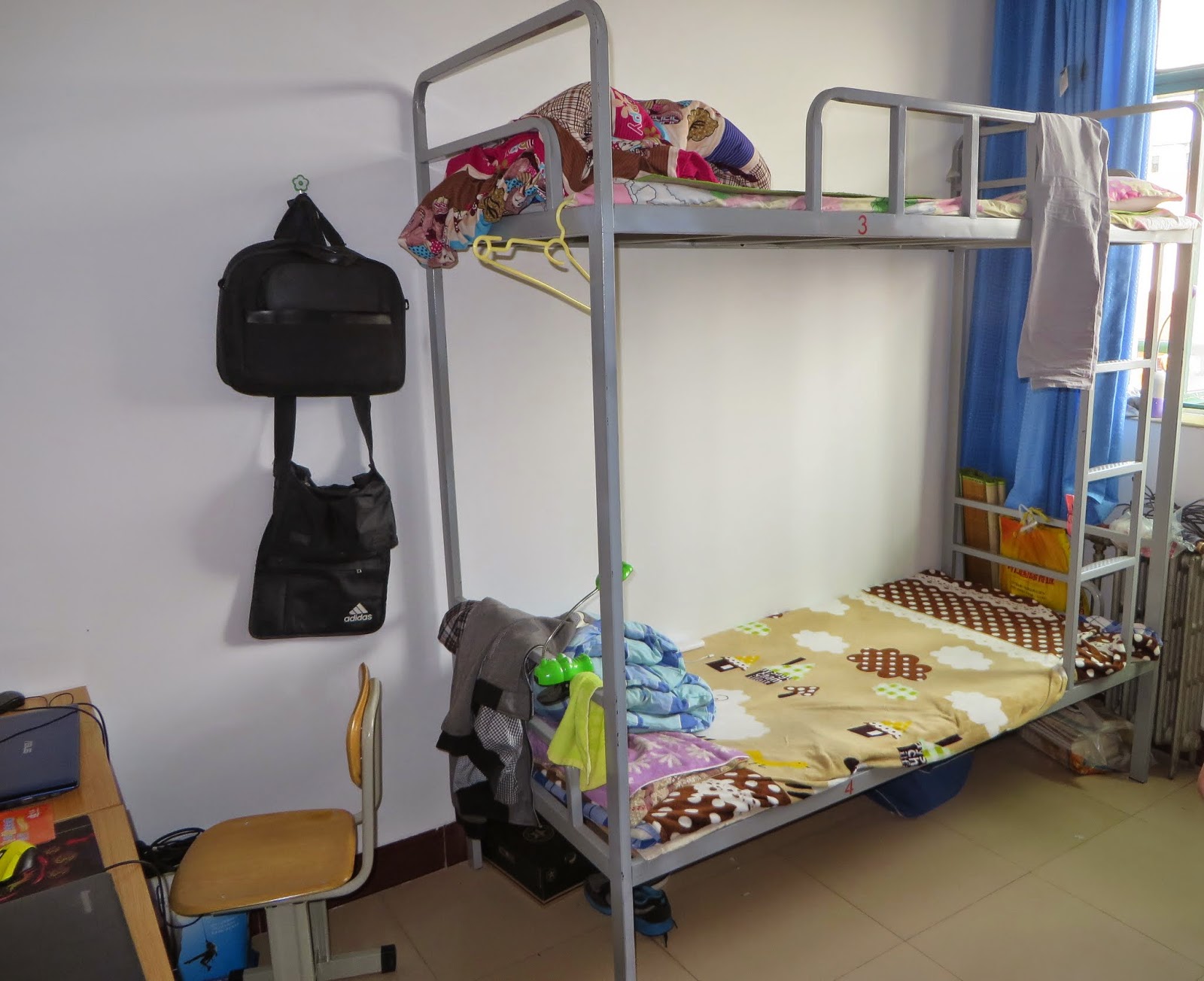 |
| This is Oliver's dormitory. The room measures 4m x 4m. It contains two lots of bunk beds. They are also provided with a metal locker each, in an adjoining room, where they keep clothes and other belongings. |
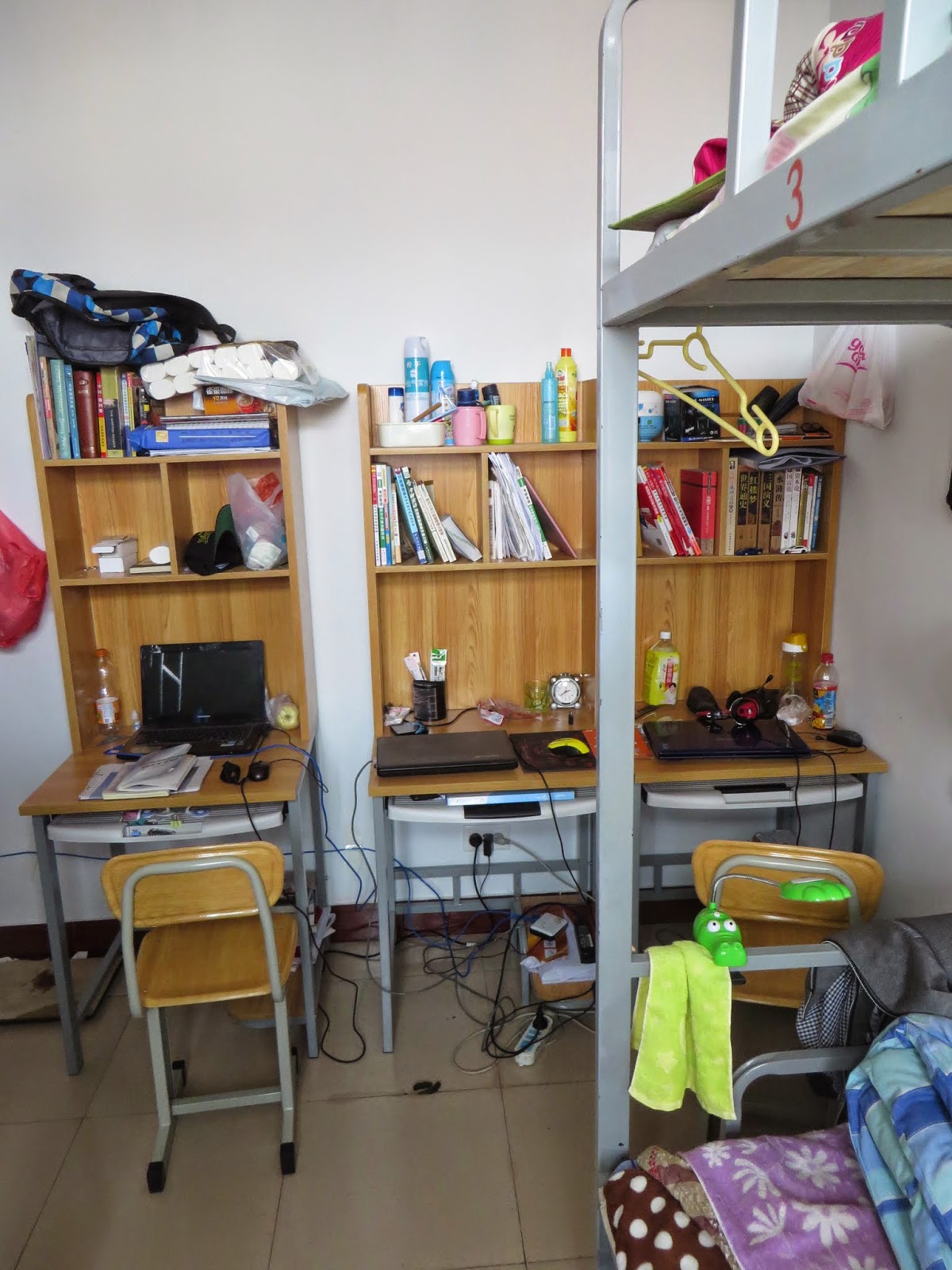 |
| Each student has a small work-station and chair. Oliver said that it is not conducive for study - he usually studies in the library or in a vacant lecture room. |
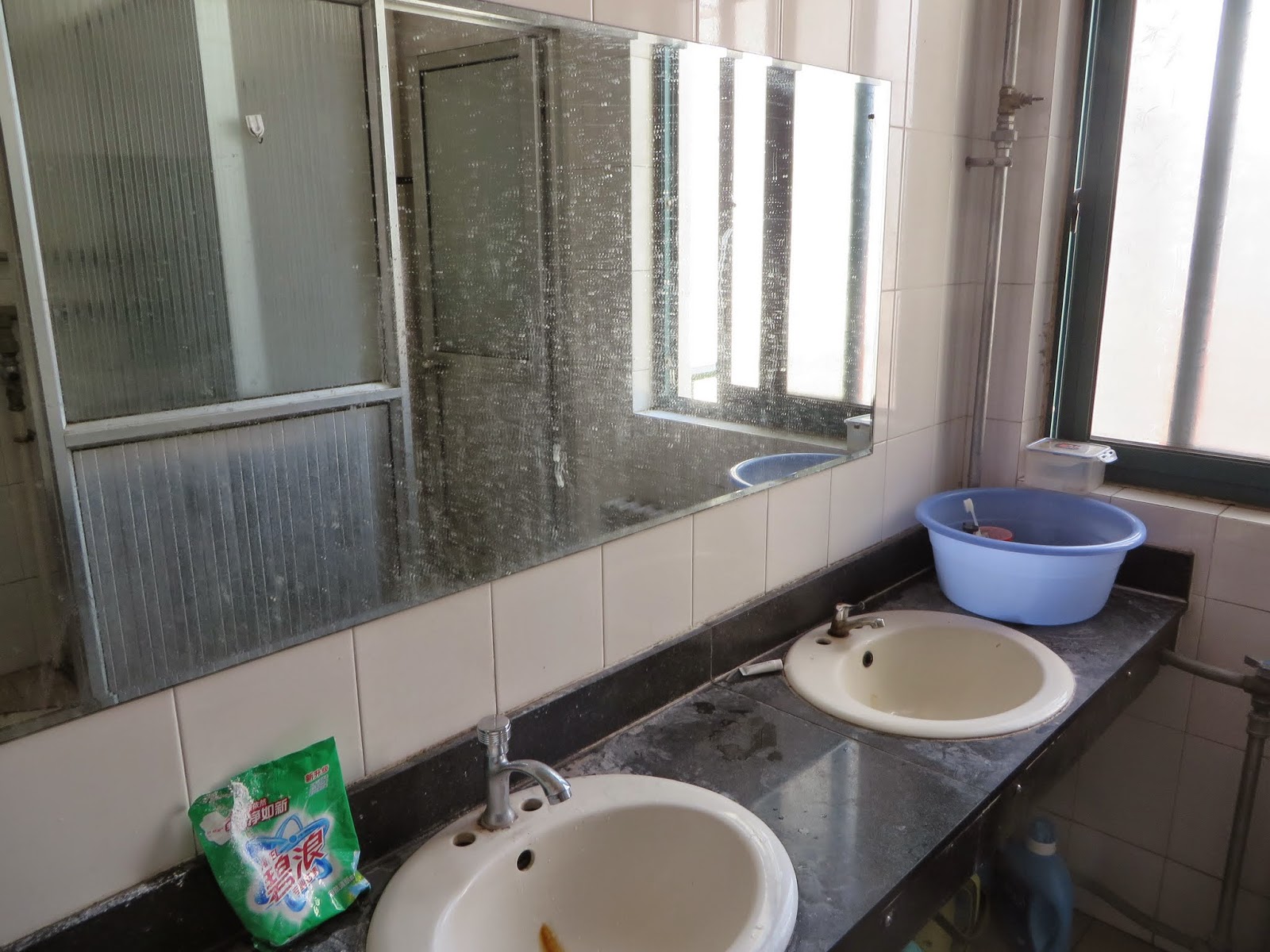 |
| The bathroom near Oliver's dorm comprises 2 squat toilets and two sinks (only cold water). If the weather isn't too hot they can sponge themselves. Oliver takes a shower in the campus public bath house 2 or 3 times a week. |
Those students who come from "the countryside" probably find the living conditions quite acceptable, but students from urban areas must find them a bit of a shock. Urban kids are usually from single-child families, and they are probably used to having their own bedroom, hot and cold running water & showers, and mother's cooking.
These are the conditions on offer, take it or leave it. And they know that, in this ultra-competitive society, if they don't want it there are dozens of others only too happy to take their place. This university is ranked in China's 'Top 100', so not an opportunity to be easily dismissed.
I admire the way Chinese students make the most of their situation. Despite their very basic (to us) living conditions, most seem well-adjusted and sensible. In class they are invariably polite, respectful and keen to learn.
Maybe the compulsory military training which all students have to undergo is part of a strategy to shock kids into accepting their new environment?
Military
training
One sees army cadets
everywhere on campus at the moment.
Every Freshman, male and female, has to participate in two-and-a-half weeks of
military training when they first start university (the length of training seems to vary slightly depending on local requirements). Our students had just two days of orientation when
they first arrived, then got their uniforms (green, jungle-camouflage style) and
started their training.
There are close to
5,000 Freshmen at the China University of Petroleum this year, so organising them
for 18 days of training is a huge logistical task.
This is going on around
the whole country. About 7 million
students enter universities every year, and probably a similar number enter
Vocational Colleges. They must all do around
18 days of military training to kick off their tertiary studies.
This system of military
training for undergraduates started in the mid-1950s, just after the Korean War, so has been going
for about 60 years.
The students are divided into groups of 50. The group leaders are
dressed in grey jungle uniforms, and come from the university’s Military Reserve
units.
The training is
rigorous. The cadets start at 6am, stop for breakfast at 7am, resume training at 8 am until about 11.30am. A break for lunch and then back into it till dinner at 5.30pm. Last year we often heard
them training at night from 7 to 9pm, but
that has only happened a couple of times this year possibly because the last week has been unusually wet.
The training focuses on
marching practice and drills and singing patriotic songs. We have never seen them with real weapons,
although apparently some universities have access to real guns and ammunition.
In China only the
police and military are allowed to have guns – it is illegal for any other citizens to possess them. Sometimes there are reports
of criminals getting hold of guns (perhaps smuggled into China from
neighboring countries such as Vietnam and Thailand), but that is rare.
The military benefits of a few days of training are questionable, so why do the Chinese persist with this activity?
I suspect the object of
the exercise is more psychological and physical, than military. It is a chance to upgrade their fitness; enhance students' sense of patriotism; remind them that they are here at the pleasure of the government; and reinforce 'acceptable' attitudes, dress and behavior.
Last year a couple of female
Freshmen students told me how difficult (physically and mentally) they found
the training. They often cried
themselves to sleep at night. Two days ago we noticed a girl having lunch by herself at the next table. She was crying quietly. Vera's Chinese is quite good and she asked her what was wrong? The girl replied that she was home-sick and finding the military training tough going.
Can you imagine spending the last 12 months studying day and night to get a good result in the National College Entrance Exam (Gao Kao) and your dreams come true when you are accepted by a top university. You relax over the summer holiday, and now here you are, finally, at what your teachers had assured you would be a wonderful new life at college.
This is the first time away from home for many students. Suddenly they are living in dormitories with five strangers. Facilities are basic, no one speaks their local dialect, and the food is different. Not only all that, but they are thrust into camouflage gear and made to march around the campus for 10 hours a day, day after day.
What a shock to most students that must be. The only saving grace is that everyone is ‘suffering’ the same fate. There
is no doubt that the shared experience would create a very strong feeling of
camaraderie and identity with their fellow students (shared pain & gain) and with the new learning
institution.
I don't want to give the impression that all students find the military training repugnant. Most accept it as inevitable and 'go with the flow'. Several, especially boys and even some girls, told me that they actually enjoyed the experience.
I remember an American
teacher, Barbara, making the observation that any individuality which the High
School system had missed, would be knocked out of the students by the military
training when they first start college.
This culture certainly
encourages conformity much more than ours does – for example, things like colored hair, or tattoos, or piercings are almost
non-existent. Rowdy behavior, and graffiti and other acts of vandalism are virtually unknown.
But they still have their
own opinions. When I do my little surveys of student opinions, I am often
surprised at the diversity of their opinions.
Vera and I are
impressed by the progress in marching skills we observed even over the course of the first
week. They look such a rabble to start
with, and yet within a relatively short period they become much more coordinated
and disciplined groups.
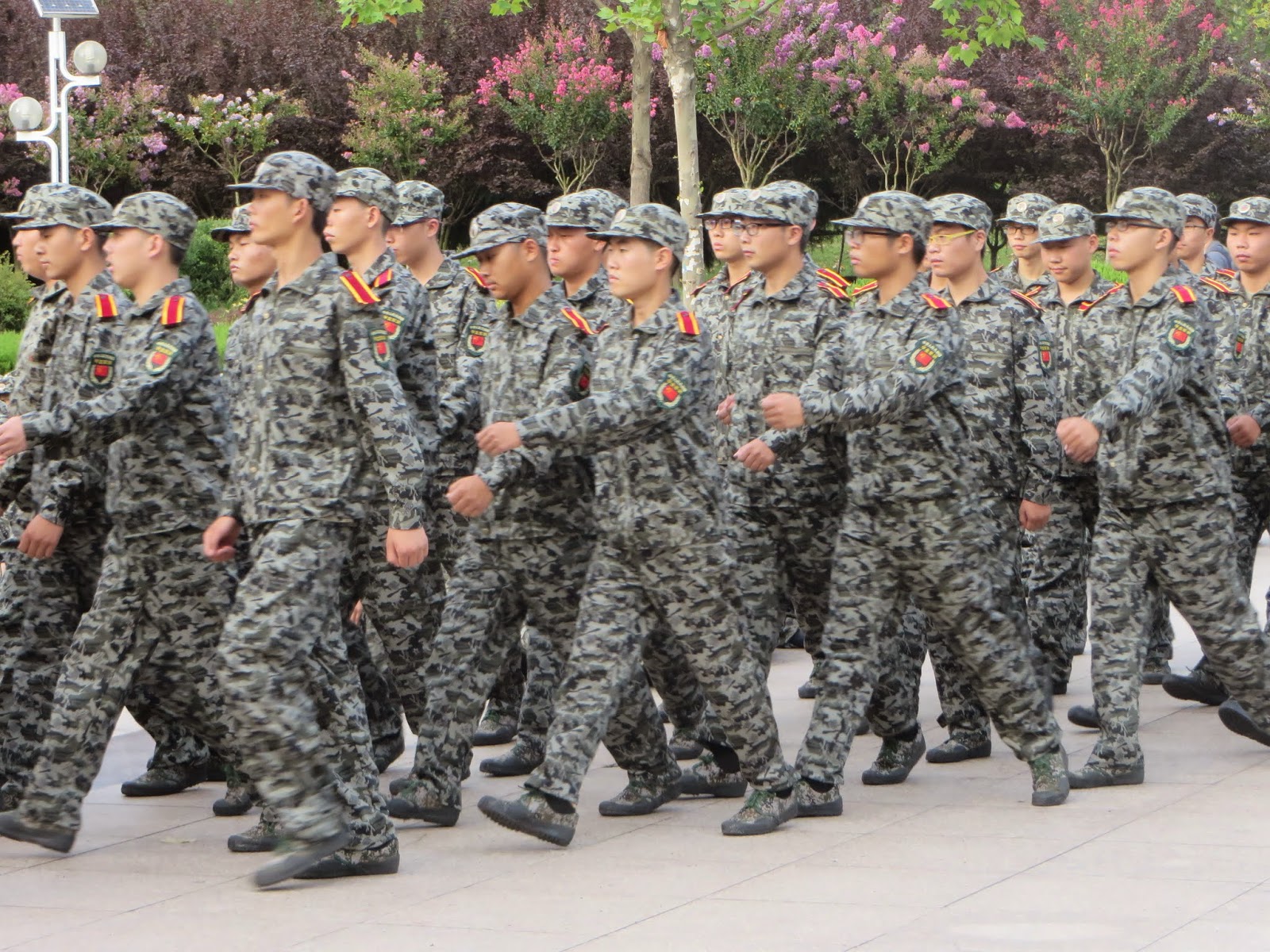 |
| A group of boys early in their military training - they were all over the place - but much improved by the second week. |
 |
| Some boys using 'wooden rifles' in their training regime. First time we have seen that. |
 |
| Girls have to do the military training too. |
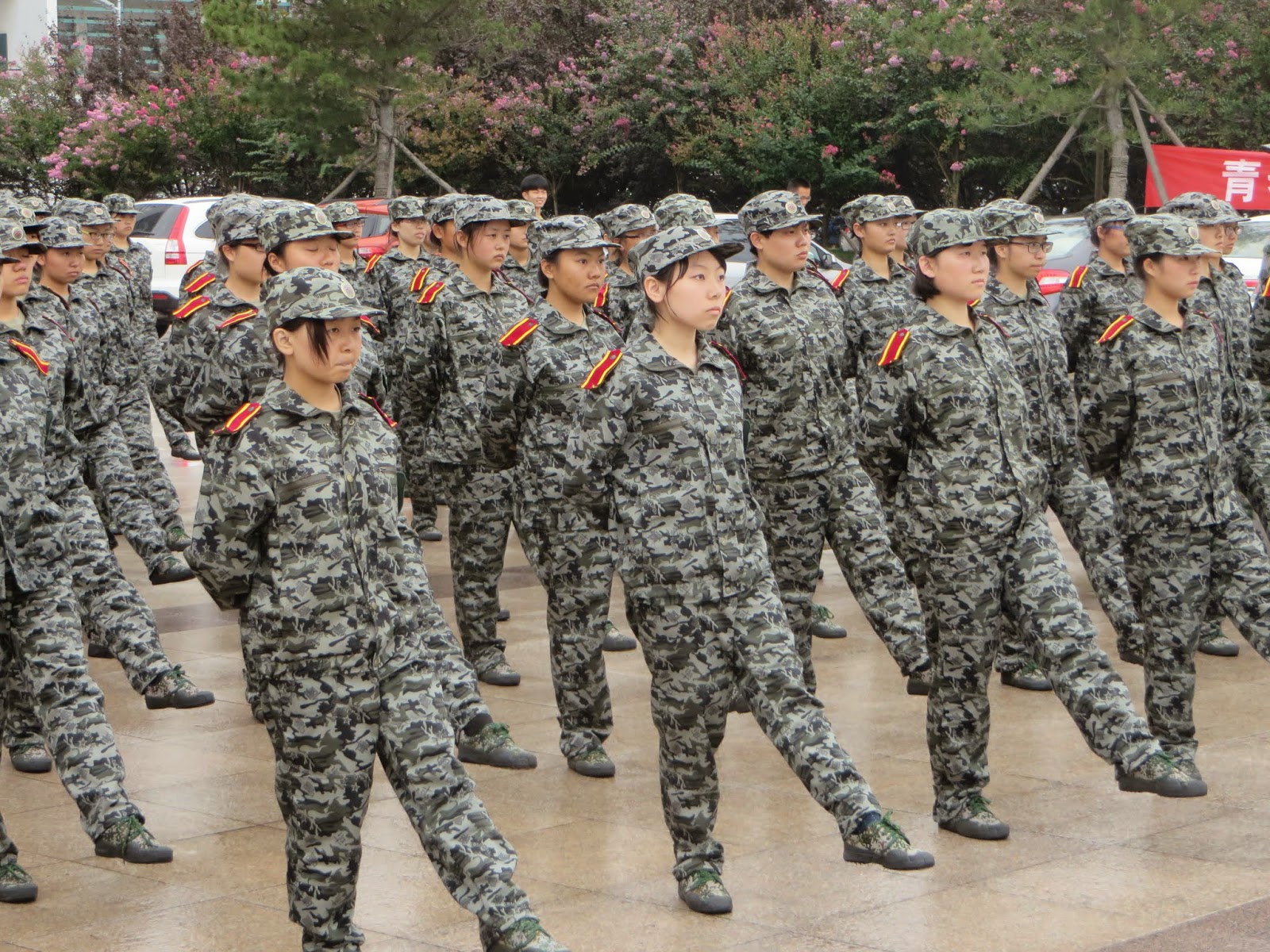 |
| Girl trainees learning to 'goose step'. |
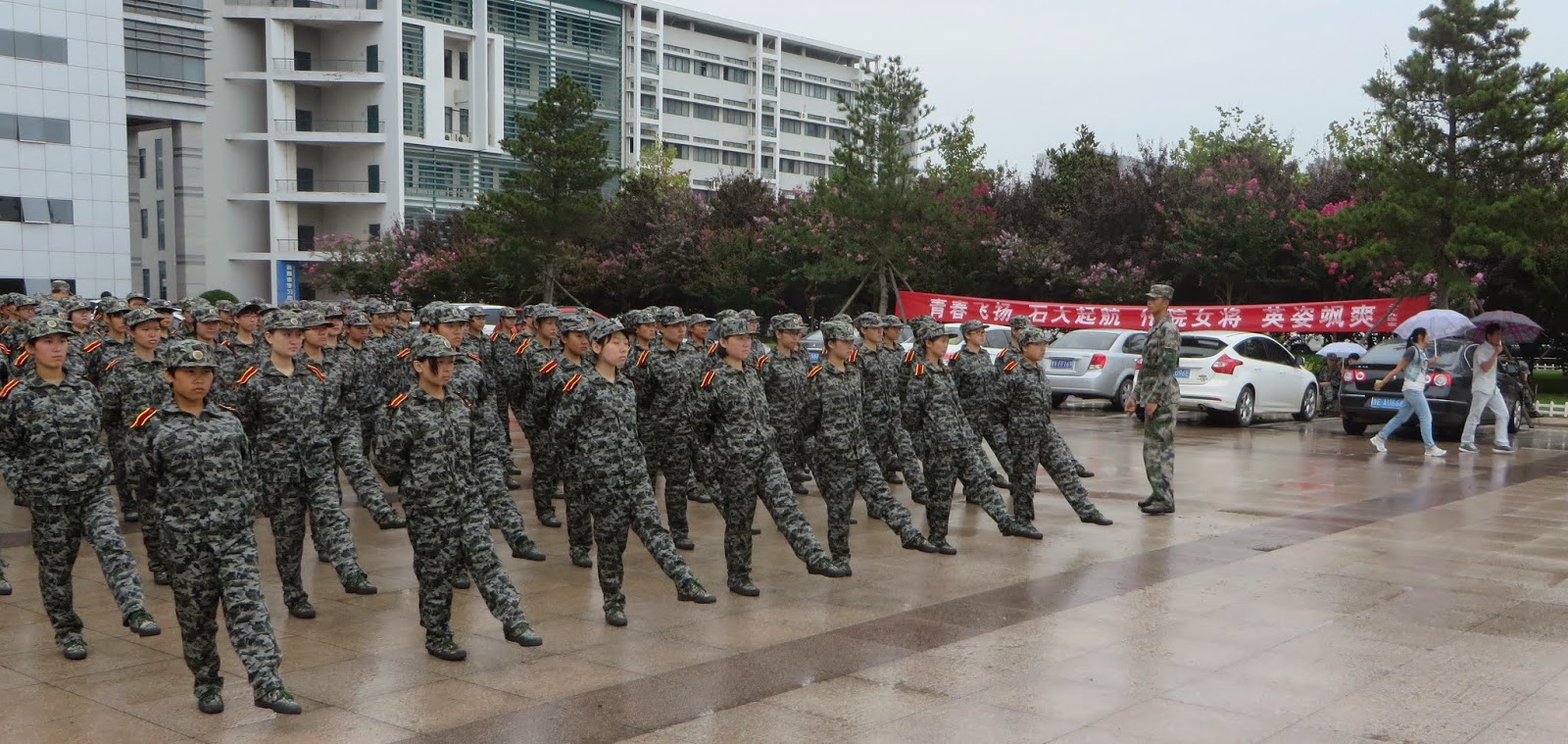 |
| See the umbrellas in the background - a bit of drizzle was not enough to stop the training. |
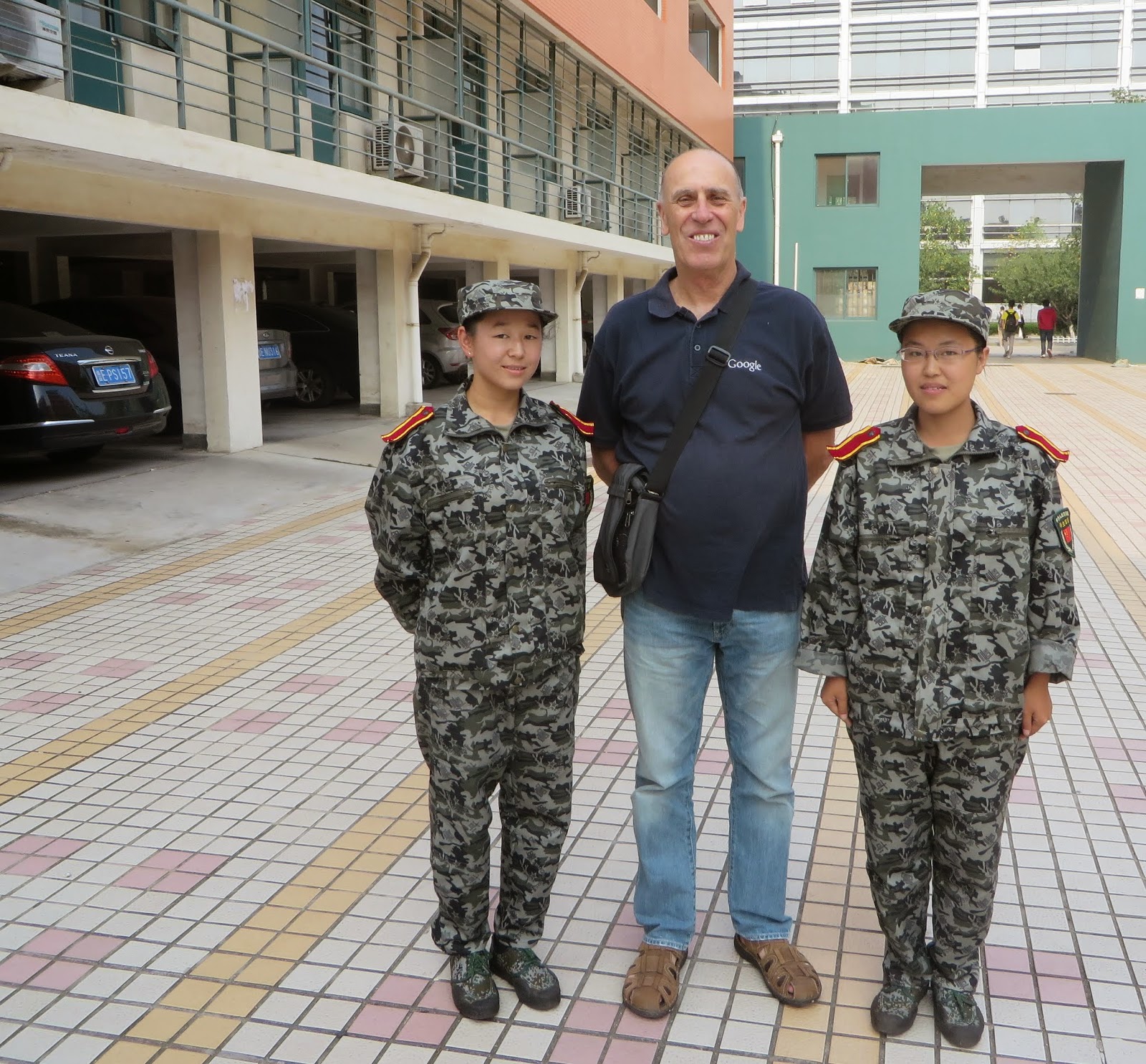 |
| I chatted to these two girls; one was from Hebei Province, the other from Xinjiang. They said they were dreading the 13 km route-march planned for the following day (Saturday - training doesn't stop on weekends) - the furthest they had ever walked was 3 or 4 km! |
I can't imagine the average Australian college student surviving Chinese conditions, and participating in military training, can you?
Vera & I intend to watch the 'final parade' which will mark the end of the training period for the Freshmen. The transformation from stragglers to precision marchers is quite amazing to see. I'll include some photos in a subsequent post.
Book
I'm half-way through Bill Clinton's fascinating autobiography "My Life: The Presidential Years". A couple of observations. Who would want to be President? Politics is the art of compromise, but what happens when one side, the Right, refuses to budge? American society seems fractured - so many interest groups all out for themselves. The other striking thing is how President Obama, 20 years on, still faces many of the very same issues: Israel; North Korea; Russia; Iraq; Immigration; Healthcare; Budget; Guns. Does it ever end???
Rugby League
The NRL is into the finals series. Two marvellous games this weekend, both won by just a point: Roosters beat the Cowboys, and the Bulldogs got home over the Sea Eagles. Looking forward to the semis next weekend.
...
That's all for this week.
Take care, and keep smiling.
Alex & Vera Olah
English teachers at China University of Petroleum, Qingdao
www.upc.edu.cn
Sunday 21 September 2014

